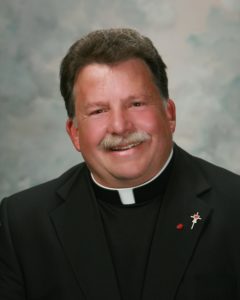By Fr. Tim McFarland, C.PP.S.
The Gospel for this Sunday has always captured my imagination. Two points stand out in my mind. One, I always wondered where the man who committed adultery was. Second, what did Jesus scribble in the dirt?
If this woman was caught in the very act of adultery, as her captors say, then there had to have been a man with her when she was caught. Where was he? Why wasn’t he here with her? Did the scribes and Pharisees just let him go? The law of Moses prescribes stoning him too.
In context, it is clear, that the scribes and Pharisees are using this woman just as bait to catch Jesus, and they have no hesitation about shaming her in the process. Maybe that is one of the reasons Jesus looks down at the ground to write in the dirt. If he is looking down and she is standing up, then he isn’t looking at her. And so he is protecting her in her shame by helping her be hidden from him, when those men were staring at her. Only when it is clear that her accusers have been caught in their hypocrisy and shamed by it, does Jesus lift up his eyes and look at her. In caring for her in this way, Jesus is doing something to protect her from the injustice of her captors.
The scribes and Pharisees are hypocritical and Jesus catches them in it. He makes clear that they don’t care enough about the law of Moses to keep it themselves. They melt away when Jesus tells them to let the ones without sin be the first to cast stones.
Unfortunately, we know that harassment and shaming of those considered vulnerable are not cruelties confined to the first century. It has continued through the ages and it happens today.
What did he write? We do not know. Maybe he just scribbled a little to give the accusers time to think about their own sins. In our contemporary world, sometimes overzealous religious individuals are very fond of pointing out the sins of others, forgetting about their own sins. Perhaps Jesus scribbling is meant to challenge us to remember “let the one who is without sin cast the first stone.”
The Gospel invites and challenges us to look honestly at our lives to see that we are not all that we can be. We rely on the mercy and forgiveness of God to be our best selves. I recall the adage attributed to John Bradford, which we should keep in mind, “There but for the grace of God go I.”
Fr. Tim McFarland, C.PP.S., is the director of ministry and mission and serves on the faculty at Calumet College of St. Joseph in Whiting, Ind.

